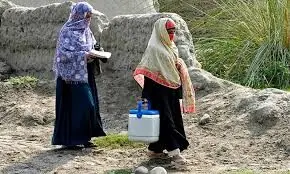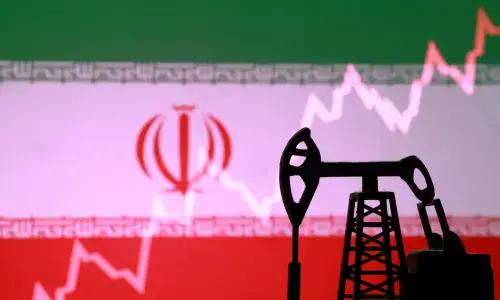RECENTLY, our prime minister attracted wide criticism for blaming the rising divorce rate on the influence of foreign media. Pakistanis usually pride themselves on their traditional family values and the respect they have for the sanctity of marriage. Yet Pakistan is one of the easiest countries in which to obtain a divorce, especially for men. Breaking up a marriage has minimal consequences as there is no concept of joint or marital ownership or income; maintenance awarded to children is usually paltry and a wife, even after a lifetime of service to her family, has no right to claim a share in the assets or income of her husband.
The clergy in Pakistan has had a big influence on the formulation of laws governing marital relationships. The Rashid Commission that was set up to formulate Pakistan’s family laws merely recommended that a talaq should be registered but even this was unpalatable! Maulana Thanvi, representing the clergy, stated that the registration of divorce or any intervention of the courts was “ridiculous and repugnant to Sharia”. He reasoned that if a man’s right to divorce was fettered in any way including through registration, it would prompt couples to resort to “vice and adultery” to obtain a divorce, following which “Muslim society would sink to the lowest depths of disgrace”. On this point only he was overruled.
Some 60 years later, we are at the same juncture. Judges rule according to their individual perceptions of religious rules and some believe that under Islam a man has an unfettered right to divorce. Despite judicial precedents, high courts have made inconsistent decisions, some holding that for an effective divorce the talaq has to be notified to the Union Council and the 90 days waiting period has to expire, while others say that a talaq is effective even if it is not notified.
The injustice to one half of the population, many of whom are dependent upon the goodwill of the other half, is the most glaring example of social inequality but receives no attention. Each commission set up to recommend changes to the law made known their concern about the lack of any recognition of matrimonial assets or income. The Zahid Commission in 1993 stated that “at the very heart of the vulnerability to which women are exposed is the lack of sharing of assets and property upon termination of marriage”. The Zahid Commission went on to state that this principle of sharing is in accordance with the principle of mata’a or kindness to a divorced woman. Mata’a is also part of Islamic principles and is mentioned in the Holy Quran.
Several Muslim countries are recognising women’s non-financial contributions to a marriage.
In some Muslim countries such as Jordan, Morocco, Algeria, Egypt, Syria, Libya and Tunisia, mata’a is paid to the wife in addition to dower and maintenance. In Pakistan, there is no concept of mata’a. Similarly, in many Middle Eastern countries, there is a strong tradition of adding conditions for financial maintenance and capital awards in the nikahnama as haq meher, yet in an overwhelming majority of marriages in Pakistan the sum remains paltry as people consider it a bad omen to speculate on a breakdown of marital ties at the time of marriage.
Pakistan is a signatory to Convention on the Elimination of all Forms of Discrimination Against Women and other international standards which stipulate that women’s non-financial contributions to a marriage must be recognised to enable an equal standing between spouses. The fact that women are entirely dependent either upon their fathers or husbands for financial maintenance in exchange for their obedience is unworkable. Therefore, in several Muslim countries more progress has been made to recognise women’s non-financial contributions to a marriage. In accepting women’s right to resources acquired through the joint efforts of parties to a marriage, these Muslim countries do not believe they are acting contrary to Islamic principles.
In Malaysia, the court can order a division of matrimonial assets after assessing each party’s contributions. Where a wife has not made financial contributions she would still be entitled to a third share of the assets depending on the length of the marriage. In Singapore, Sharia courts have the discretion to take into account the wife’s contributions to the family, such as caring for the home and the children. Where a wife has made no direct financial contribution, she is usually still entitled to about 35 per cent of the assets. In Turkey, revisions to the Civil Code stipulate that the equal division of property and assets acquired during the marriage is the default property regime. In Indonesia, women’s non-financial contributions are recognised and the court has the discretion to split the matrimonial property upon divorce.
Ironically, while the concept of the family is usually touted as sacred, laws regulating family relationships are the last to be brought in line with the changing global trends. In England, divorce is still fault-based as the state is too worried to tread on a sensitive subject. In India, in 1985 the Congress government almost fell when the Muslim community were up in arms over a supreme court judgement granting a 62-year-old divorced woman, Shah Bano, maintenance of Rs179.20 per month from her well-to-do husband who had thrown her out of the house after 46 years of marriage. The Indian government quickly introduced a new law to override the judgement and keep its voters happy.
Reforms empowering women within their homes become an emotive issue but until a woman does not have some semblance of security within her home, it is difficult for her to make any contribution to society or the economy. Many women stay in abusive marriages for fear of finding themselves on the street. Regulations regarding violence, harassment and polygamy are of course beneficial, but a man will only appreciate the sanctity of marriage and the value of good behaviour at home when he has to share his assets and income fairly.
The writer is a board member, AGHS Legal Aid Cell, an advocate of the high courts, Pakistan, and a solicitor of the senior courts of England and Wales.
Twitter: @sj244
Published in Dawn, March 2nd, 2020






























